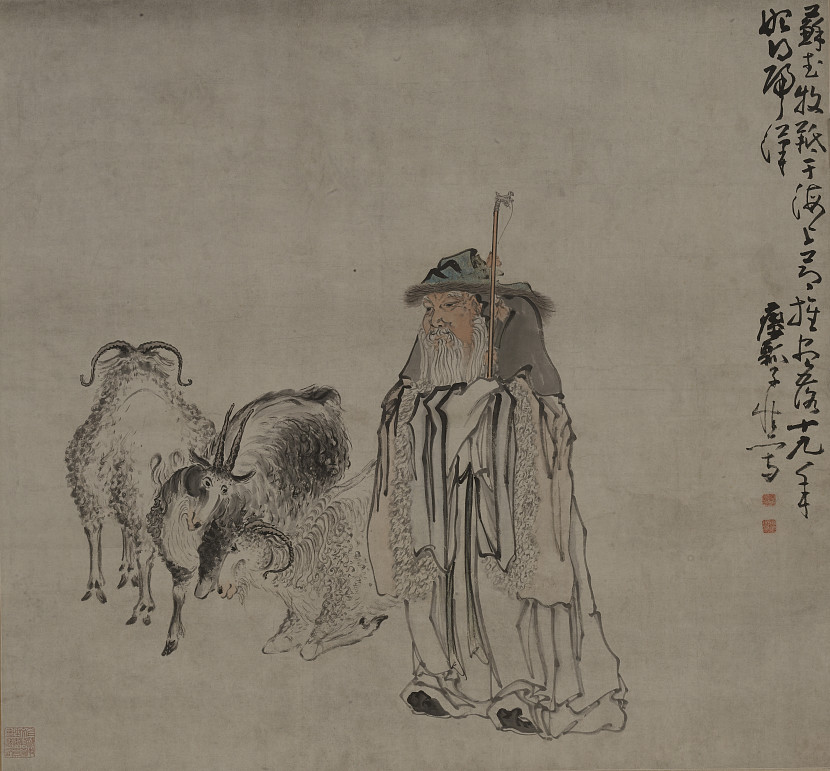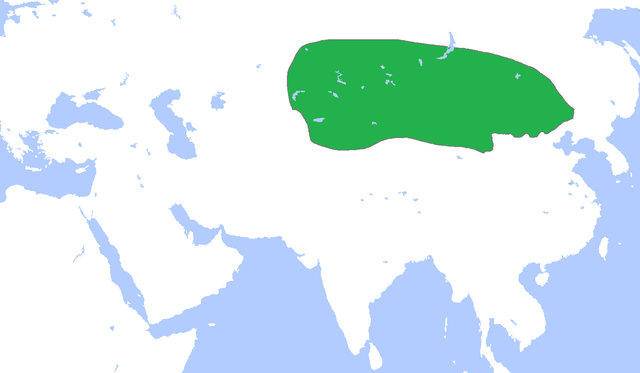苏武牧羊 (Su Wu Mu Yang)
蘇武牧羊北海邊 雪地又冰天 羈留十九年 渴飲雪 飢吞氈 野幕夜孤眠 心存漢社稷 夢想舊家山 歷盡難中難 節旄落未還 兀坐絕寒 時聽胡笳 入耳心痛酸 #杀杀中文
今天突然脑子里在唱苏武牧羊。上 YouTube 听了几首,看了歌词,又去看历史,地理,看了2小时。。。好渊远。

That's a old Chinese patriotic song, singing about a China hero Su Wu of year BC 100.
Su Wu (simplified Chinese: 苏武; traditional Chinese: 蘇武; pinyin: Sū Wǔ; 140 BC to 60 BC) was a Chinese diplomat and statesman of the Han Dynasty.
He is known in Chinese history for making the best of his mission into foreign territory. During his mission he was captured and then detained for nineteen years, enduring major hardship at least in the early years of his captivity. Nevertheless, he endured this treatment while remaining faithful to his mission and his homeland.
According to Chinese tradition, in the early stages of his captivity, Su Wu was so deprived of food that he only survived in the cold north lands by eating his coverings, then enduring long years of servitude herding sheep, before managing to return home. He was able to return home after deceiving his captors with a story about his having sent a message back to China by means of tying a letter on the leg of a wild goose.
Here's a karaok version of the song:
lol, this version, has a brunette chick prancing around on the beach. So out of place. #xahwords of the day is: incongruous.
蘇武牧羊 作詞:蔣蔭棠 作曲:田錫侯 蘇武牧羊北海邊 雪地又冰天 羈留十九年 渴飲雪 飢吞氈 野幕夜孤眠 心存漢社稷 夢想舊家山 歷盡難中難 節旄落未還 兀坐絕寒 時聽胡笳 入耳心痛酸 蘇武牧羊久不歸 群雁卻南飛 家書欲寄誰 白髮娘 望兒歸 紅粧守空幃 三更徒入夢 未卜安與危 心酸百念灰 大節仍不少虧 羝羊未乳 不道終得 生隨漢使歸
Who is Xiongnu (匈奴)
the basic story of Su Wu is that, he's a diplomat of China ~100BC. China and Xiongnu are fighting on and off. He (age 50) is sent to Xiongnu to negotiate, but ends up forced there for 19 years in extreme harsh conditions but refused to surrender.

it turns out, we don't know who exactly is Xiongnu (匈奴) , just that they were nomadic tribe living around today's Russia and Mongolia. theories say they are Huns, Iranian, Mongolic, Turkic, Yeniseian... seems the only historical record about them is China's.
Here's Wikipedia:
The Xiongnu [ɕjʊ́ŋ.nǔ] (Chinese: 匈奴; Wade–Giles: Hsiung-nu) were a confederation[3] of nomadic peoples who, according to ancient Chinese sources, inhabited the eastern Asian Steppe from the 3rd century BC to the late 1st century AD. Chinese sources report that Modu Chanyu, the supreme leader after 209 BC, founded the Xiongnu Empire.[4]
After their previous overlords, the Yuezhi, migrated into Central Asia during the 2nd century BC, the Xiongnu became a dominant power on the steppes of north-east Central Asia, centred on an area known later as Mongolia. The Xiongnu were also active in areas now part of Siberia, Inner Mongolia, Gansu and Xinjiang. Their relations with adjacent Chinese dynasties to the south east were complex, with repeated periods of conflict and intrigue, alternating with exchanges of tribute, trade, and marriage treaties.
Attempts to identify the Xiongnu with later groups of the western Eurasian Steppe remain controversial. Scythians and Sarmatians were concurrently to the west. The identity of the ethnic core of Xiongnu has been a subject of varied hypotheses, because only a few words, mainly titles and personal names, were preserved in the Chinese sources. The name Xiongnu may be cognate with that of the Huns or the Huna,[5] although this is disputed.[6][7] Other linguistic links — all of them also controversial — proposed by scholars include Iranian,[8][9][10] Mongolic,[11] Turkic,[12][13] Uralic,[14] Yeniseian,[6][15] Tibeto-Burman[16] or multi-ethnic.[17]
2018-12-08 Xiongnu